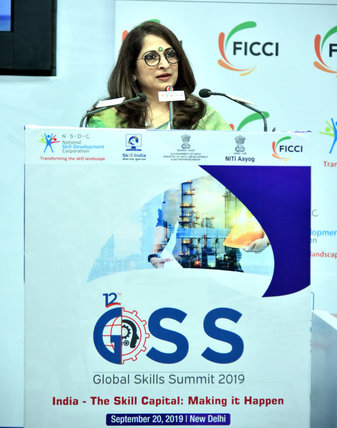 “Making India the Skill Capital”, the theme of Global Skills Summit (GSS) organized by Federation of Indian Chambers of Commerce and Industry (FICCI) has many enlightening sessions. The inaugural session focused on building the larger context with presentations from leaders in the skilling ecosystem in India, representing the government, the corporate and international insights. Moderating the session, Ms Shobha Mishra Ghosh Assistant Secretary General, FICCI, established the key links between the presentations by highlighting issues like the need to learn from the experience of states like Odisha and Karnataka, besides ensuring successful implementation of the initiatives through strategic partnerships involving ground level stakeholders.
“Making India the Skill Capital”, the theme of Global Skills Summit (GSS) organized by Federation of Indian Chambers of Commerce and Industry (FICCI) has many enlightening sessions. The inaugural session focused on building the larger context with presentations from leaders in the skilling ecosystem in India, representing the government, the corporate and international insights. Moderating the session, Ms Shobha Mishra Ghosh Assistant Secretary General, FICCI, established the key links between the presentations by highlighting issues like the need to learn from the experience of states like Odisha and Karnataka, besides ensuring successful implementation of the initiatives through strategic partnerships involving ground level stakeholders.
To capture the essence of the presentations Team NSN presents snapshot of the inaugural session:
Mr Bijay Sahoo, Chair, FICCI Skill Development Committee (SDC) and Group President, HR, Reliance Industries Ltd
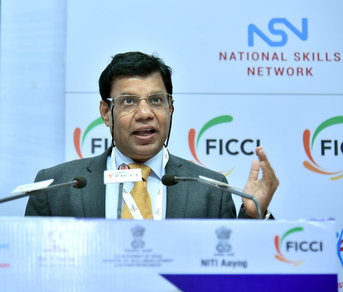 “There are many elements that go into making India the Skill Capital of the world. Lot of action is needed from the government and non-government along with each Indian. We need to alert every Indian to make it demographic dividend. We have to re-establish our connect with agriculture, handicrafts and handlooms to increase employment. Our country could survive the recession in 2008 due to the flourishing rural economy, today, it needs to be revived. Automation, Artificial Intelligence, IoT etc are affecting the jobs but new jobs are getting created.
“There are many elements that go into making India the Skill Capital of the world. Lot of action is needed from the government and non-government along with each Indian. We need to alert every Indian to make it demographic dividend. We have to re-establish our connect with agriculture, handicrafts and handlooms to increase employment. Our country could survive the recession in 2008 due to the flourishing rural economy, today, it needs to be revived. Automation, Artificial Intelligence, IoT etc are affecting the jobs but new jobs are getting created.
Mobility of workforce needs skills and it has regulatory aspect; we will not have enough work for Indians in India, there are opportunities in Japan and Germany due to ageing populations and they have economic compulsions to welcome people from other countries. We must have talent equilibrium. In the past, India was skilled India it was the skill capital, as per economic data. Today, China and Korea are ahead in vocational skills, if a nation forgets skills it will have to compromise, we have to balance with job of the head and hands.”
Dr Amer Awadh Al Rawas, Founding Partner of Paradigms Consulting LLC & Former Group CEO, Tasnea Oil & Gas Technology
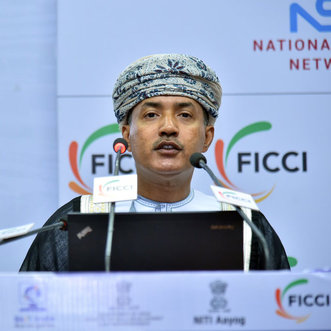 “Artificial Intelligence (AI) is disrupting financial, economic and social domains, thus affecting the value chain. We have to be positive since technology always brings opportunities. Most of the low skilled jobs will be taken by automation and AI like cleaner or a waiter. New business opportunities are emerging, for example in the automotive sector, driverless cars will create markets for leasing cars or from repair and service. Oman needed skills from India to build the nation.
“Artificial Intelligence (AI) is disrupting financial, economic and social domains, thus affecting the value chain. We have to be positive since technology always brings opportunities. Most of the low skilled jobs will be taken by automation and AI like cleaner or a waiter. New business opportunities are emerging, for example in the automotive sector, driverless cars will create markets for leasing cars or from repair and service. Oman needed skills from India to build the nation.
We are now entering the third phase of sustainability, having passed through the infrastructure and services phases. And it needs lots of social skills and emotional skills that can integrate in societies well. Indians have always adapted better, diversity and inclusion has been easy of language and culture. The only way to prepare for the future is to learn 21st century skills like problem solving, coding, critical thinking, empathy etc. Robots might replace people, due to AI, human thinking can be automated but robots don’t feel or understand our desires, this is where we need people with emotional intelligence.”
Mr Subroto Bagchi, Chairman, Odisha Skill Development Authority, Government of Odisha
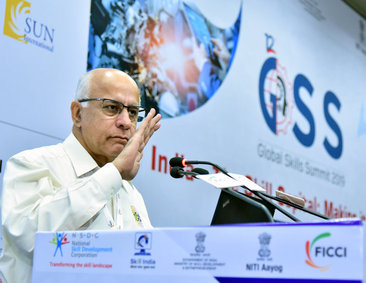 “We shifted the conversation from skill to skilled in Odisha, build aspiration branded idea that best skilled people come from Odisha. We made it measurable by doing these three things:
“We shifted the conversation from skill to skilled in Odisha, build aspiration branded idea that best skilled people come from Odisha. We made it measurable by doing these three things:
- Deliver an ethos through which corporate India will make a bee line to lock in talent from Odisha, by going to the ITIs
- Make a sand box, the Odisha model, getting inspired by Bangladesh is the inspiration
- Fix the ITIs by taking us various initiatives, right from the changing of the uniform
If ITI s don’t succeed there’s no point in creating great ITIs. We used the 10-6-4-2 formula to create the ITI hall of fame and take pride in their achievements. From each district we picked up 10 names of students, 6 who have gone outside the state, 4 girls who are doing tough and heavy and risky jobs, 2 who have become entrepreneurs instead of standing in the job queue. We created role models for the students. With regard to the ITI principals, 100 of them were sent to ITE Singapore and when they returned, they have to write down their vision, mission and values in order to build human-centricity in all their endeavours.
Other major interventions include:
- Set up design museum in Cuttack to inculcate design appreciation among ITI students
- Scaling up short term skilling program like DDU-GKY where Odisha has been the best performing state
- Actively seeking employer participation through direct employment and not through contractors
- Setting up an AR VR incubator with ⅓ philanthropic capital ⅓ state capital and ⅓ state capital from Government of India
- World skills center coming up in Bhubaneswar at the cost of 200 million USD, global participation and global faculty, 8 major areas finishing school from ITIs and polytechnic
- Holding skills competitions at state level and embarking on mission 1 2 3 for World Skills where in Odisha bagged the first gold medal at the ratio of 5000:1 and the journey cost the state government Rs.8. 5 crores”
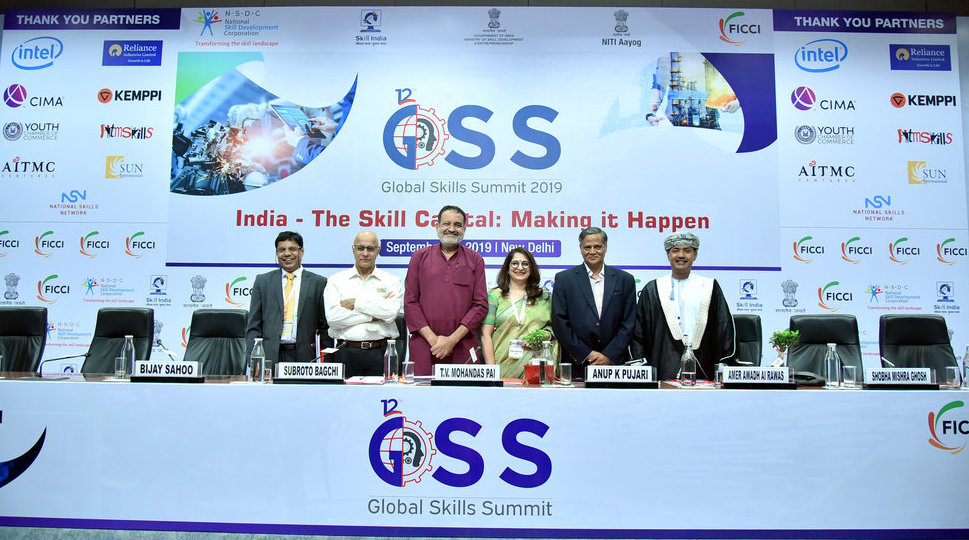 Dr Anup K Pujari, Chairman, Karnataka Skill Development Authority, Government of Karnataka
Dr Anup K Pujari, Chairman, Karnataka Skill Development Authority, Government of Karnataka
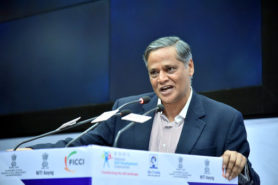 “Karnataka is the first state to have a skill development policy even before the Government of India had planned for it. The state has always focused on skilling to bridge the gap and address the shortage of skilled workforce. We set up 2000 overseas employment units to facilitate access to global job opportunities. The state has always focused on equity and equality to bring into the fold the disadvantaged and avoid discrimination. The 3 Es – Enlighten, Equip and Empower have been the guiding principles of all the initiatives. With regard to migration at the district level, we’ve streamlined our efforts with regard to getting information at the district level, providing pre-migration information and extending related support.
“Karnataka is the first state to have a skill development policy even before the Government of India had planned for it. The state has always focused on skilling to bridge the gap and address the shortage of skilled workforce. We set up 2000 overseas employment units to facilitate access to global job opportunities. The state has always focused on equity and equality to bring into the fold the disadvantaged and avoid discrimination. The 3 Es – Enlighten, Equip and Empower have been the guiding principles of all the initiatives. With regard to migration at the district level, we’ve streamlined our efforts with regard to getting information at the district level, providing pre-migration information and extending related support.
We need to look at skilling as a supplemental model and not only aspirational model since people can generate livelihoods and additional source of income. These are people who don’t want to be uprooted from where they are working, can use some time of their own. Skilling for the sake of it is also important and it can’t always be linked to jobs. In fact, skilled people, most often find their own jobs and they are rarely unemployed. Our value system is affecting the importance of skilled people, hence we need cultural changes.”
Mr Mohandas Pai, Honorary Adviser, FICCI Skill Development Committee (SDC) and Chairman, Manipal Global Education
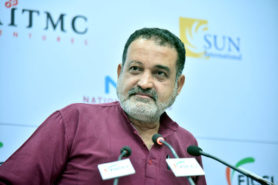 “The biggest challenge in our country is to reap the demographic dividend. All over the world, population is shrinking and life span is coming down.The composition of population matter since it impacts productivity and skills. By 2030, the developed world will be older and population will shrink.
“The biggest challenge in our country is to reap the demographic dividend. All over the world, population is shrinking and life span is coming down.The composition of population matter since it impacts productivity and skills. By 2030, the developed world will be older and population will shrink.
Workforce mobility is the order of the day! If you look at India we have an interesting example in Kerala. Today, 9% of the population does not speak Malayalam and these are migrants from Bihar who have taken up many unskilled jobs. India is undergoing tremendous demographic changes. We need skilling programs for different sectors, from regions and economic backgrounds in services, agriculture etc. Hence, we can’t have one uniform policy for all, because we don’t have a homogeneous set up. States should have their own policy based on their native genius, and economic requirements
Our performance at World Skills Competitions has been good, to encourage the spirit and culture of competitions, we need a Center of Excellence with latest technologies and tools and of course good trainers. L&T Construction Academy has one such facility.
When it comes to integrating vocational training in schools, we need to start after class 11 since this gives an opportunity for every child from every strata of society to complete class 12. At higher education level, we need to come out colonial mindset and the notion of degree linked with formal education. Why can’t a professional farmer get an MBA? There needs to be a huge movement to recognize prior learning. RPL gives pride to people and it is a huge challenge to instill pride in one’s work, with things done with our hands.
For ages our education system has suppressed curiosity and creativity. These need to be promoted all across the schools. Dual model of education like in Germany is another option to integrate skills with education. Most importantly, we need to ensure that skilled people are paid more. Anyone with skills certificate should be paid 20% more, the certificate should have value and 70% of Indians who are self-skilled need formal recognition for better work, pay and higher education.”




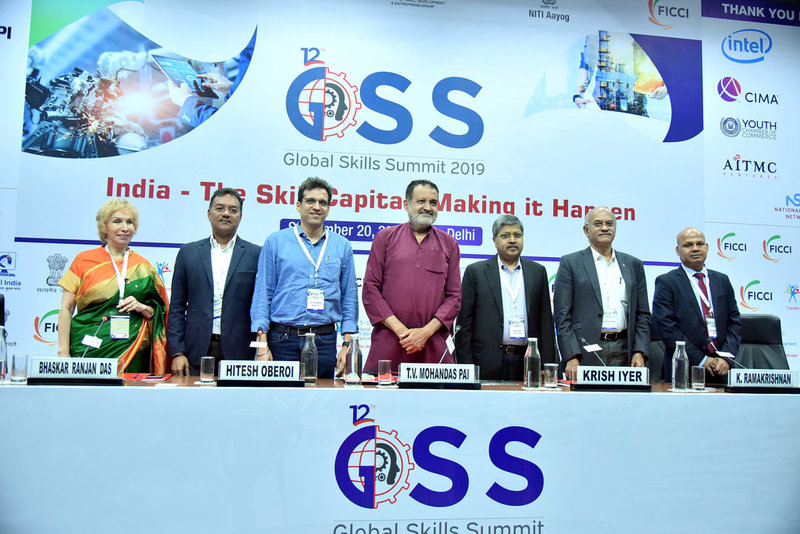









Comments 1